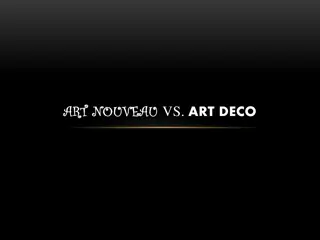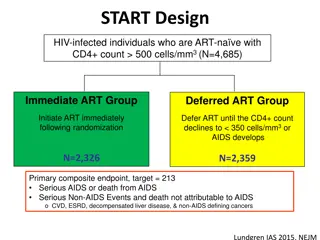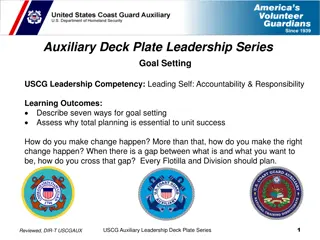Mastering the Art of Goal Setting for Sustainable Success
Effectively developing good goals is essential for maintaining a consistent pace towards success. By ensuring goals are SMART (Specific, Measurable, Accountable, Realistic, Timetabled), individuals can enhance their focus, motivation, and progress tracking. Specific goals help in clarifying objectives, measurable goals enable progress evaluation, achievable goals maintain realism, relevant goals tie into overall success, and timely goals impose deadlines for accountability and progress measurement.
Download Presentation

Please find below an Image/Link to download the presentation.
The content on the website is provided AS IS for your information and personal use only. It may not be sold, licensed, or shared on other websites without obtaining consent from the author. Download presentation by click this link. If you encounter any issues during the download, it is possible that the publisher has removed the file from their server.
E N D
Presentation Transcript
Goal Setting Developing good goals will ensure a steady P R E S E N T A T I O N pace towards success. Goals should be SMART: Specific, Measurable, Accountable, Realistic and Timetabled. CLICK TO BEGIN
SMART GOALS S PECIFIC M EASURABLE A CCOUNTABLE R EALISTIC T IMETABLED
SPECIFIC GOALS Simple Sensible Significant Specific: (simple, sensible, significant) Goals need to be clear and specific to enable people to focus their efforts and be motivated. Vague undefined goals hinder people s enthusiasm and can lead to early frustration. Questions to ask include: What do I want to accomplish? Why is this goal important? Who is involved? Where is it located? Which resources or limits are involved?
MEASURABLE GOALS Easy to track Marker of progress Increases motivation Measurable: Goals need to be measurable to enable people to determine if they are making progress towards achieving them. Seeing progress helps keep people motivated and focused. It also helps people realize when progress is not being made so they can identify problems and figure out solutions. Questions to ask include: How long should it take to accomplish a particular goal? What steps do I need to undertake to achieve a goal? What does it look like when the goal is accomplished?
ACHIEVABLE GOALS Long-term goals Short-term objectives You are here Realistic plan of action This is your goal. How do you get here?
RELEVANT GOALS Goals must be part of overall success Focused objectives Goals must match business needs
TIMELY GOALS Goals must have deadlines Timelines helps avoid procrastination Measure of progress
GOAL CHART Challenge Goal Action Steps Deadline























